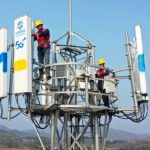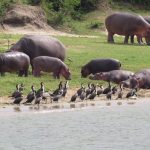Agriculture is the backbone of Rwanda’s economy, and coffee remains one of its most valuable exports. In 2022 alone, Rwanda exported $112 million worth of coffee, making it the 39th largest coffee exporter in the world. Coffee was also the country’s third-largest export, reflecting its importance as a key source of income for thousands of Rwandan farmers.
Renowned for its high-quality Arabica beans, Rwandan coffee is highly sought after on the international market for its distinctive flavour profile. However, climate change and plant diseases are putting the industry at risk, threatening both yields and quality. To ensure Rwanda’s coffee sector remains competitive and sustainable, nuclear technology is emerging as an innovative solution.
Coffee is not just a commodity in Rwanda – it is a national asset, shaping the country’s economic landscape for over a century.
The coffee sector provides livelihoods for over 400,000 smallholder farmers, the majority of whom rely on it as their primary source of income.
Unlike large-scale plantations found in other coffee-producing countries, Rwandan coffee farming is dominated by small-scale cooperatives where families cultivate high-altitude Arabica beans known for their fruity acidity and floral notes.
Rwanda has already taken steps to integrate nuclear science into agriculture, particularly through the Centre for Nuclear Science and Technology (CNST).
This facility will play a crucial role in agricultural research, isotope production, and soil analysis, offering new opportunities for improving crop resilience.
With nuclear applications already being explored for various agricultural challenges, the CNST has the potential to become a hub for nuclear-driven farming solutions in Rwanda and beyond.
Climate change is significantly altering weather patterns, making traditional coffee-growing regions less suitable for cultivation. Rising temperatures, irregular rainfall, and prolonged droughts are negatively impacting crop yields.
Moreover, coffee rust, a devastating fungal disease, is spreading more aggressively due to these changing conditions causing major losses for coffee farmers worldwide.
Recognising the urgency of the problem, the International Atomic Energy Agency (IAEA), in partnership with the Food and Agriculture Organisation of the United Nations (FAO), is working with national experts to develop coffee varieties that are resistant to coffee rust through nuclear plant breeding techniques.
For the first time, the IAEA is training specialists to use radiation-induced mutagenesis, a technique that accelerates natural plant mutations to create stronger, disease-resistant coffee plants.
This technology has already proven successful in improving crops such as wheat, rice and barley, and now it is being applied to coffee.
Rwanda, as a leading coffee-producing nation, can benefit immensely from this research by integrating these techniques into its agricultural development programmes.
The use of nuclear technology in agriculture is not limited to fighting plant diseases. It also plays a crucial role in improving soil fertility and optimising fertiliser use. Rwanda’s CNST, will be able to support radioisotope-based agricultural studies, including the use of nitrogen-15 tracking to analyse fertiliser efficiency.
This method allows scientists and agronomists to measure how effectively coffee plants absorb nutrients, ensuring better soil management, reduced fertiliser waste, and improved crop yields.
By using these nuclear tools, Rwandan coffee farmers will be able to enhance bean quality while maintaining sustainable agricultural practices.
The impact of nuclear agriculture extends far beyond higher crop yields. By integrating nuclear techniques into Rwanda’s coffee sector, the country can significantly boost farmer income and economic stability.
Smallholder farmers, who are particularly vulnerable to climate-related yield losses, will have access to more resilient coffee plants, ensuring steady production despite environmental fluctuations. This will provide long-term security for farming communities, reducing poverty and strengthening rural economies.
Nuclear innovations can also lower production costs for farmers. With optimised fertiliser use and enhanced soil health monitoring, farmers can reduce unnecessary expenses while increasing efficiency.
Furthermore, higher-quality coffee beans will enable Rwandan producers to fetch premium prices on the global market, reinforcing Rwanda’s position as a leader in specialty coffee exports.
The introduction of nuclear-based agricultural techniques can also stimulate job creation and knowledge development. As Rwanda invests in scientific research through the CNST, the demand for trained agronomists, nuclear scientists, and agricultural technicians will increase.
This knowledge transfer will empower the next generation of Rwandan researchers and farmers, ensuring that nuclear technology becomes an integral part of the country’s agricultural landscape.
Beyond its borders, Rwanda’s leadership in nuclear-driven agriculture could strengthen regional partnerships. As a pioneer in adopting nuclear-enhanced coffee cultivation, Rwanda could share best practices and expertise with other African coffee-producing nations facing similar climate challenges.
This could position the country as a regional hub for agricultural innovation, attracting scientific collaboration, investment, and trade opportunities.
Rwanda’s coffee industry is at a turning point. With climate change and plant diseases threatening production, embracing nuclear technology is no longer an option – it is a necessity.
By integrating nuclear plant breeding, isotope tracking, and soil analysis, Rwanda can ensure the long-term sustainability of its coffee sector while improving economic outcomes for farmers.
International collaboration will be key to unlocking the full potential of nuclear technology in Rwandan agriculture. With support from organisations like the IAEA, FAO and nuclear companies, Rwanda has an opportunity to modernise its coffee industry, enhance crop resilience, and secure long-term economic growth.
As global coffee demand continues to rise, embracing nuclear innovation could help Rwanda cement its reputation as a leader in sustainable, high-quality coffee production.









